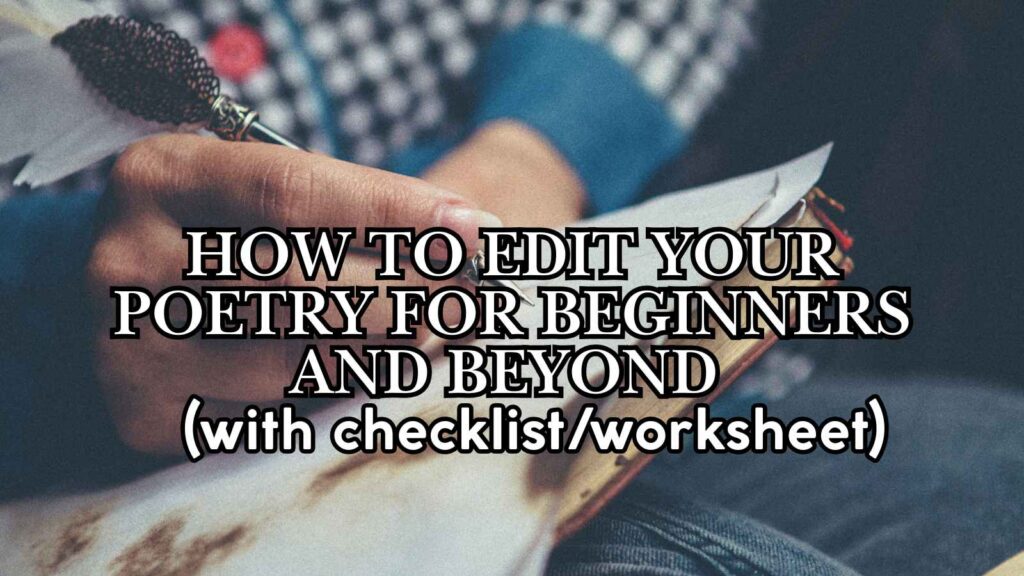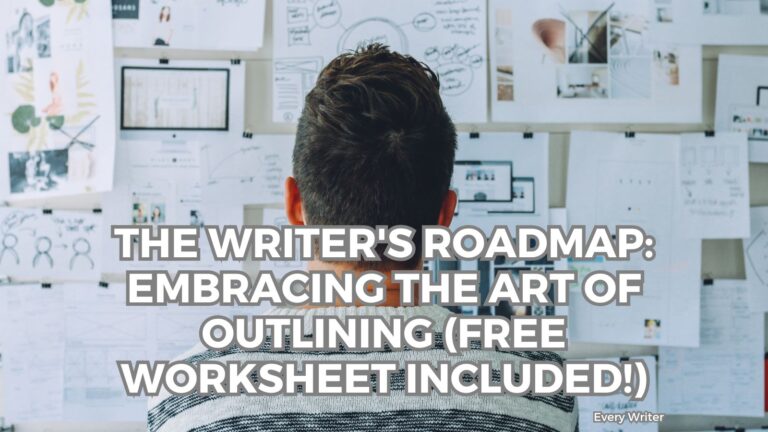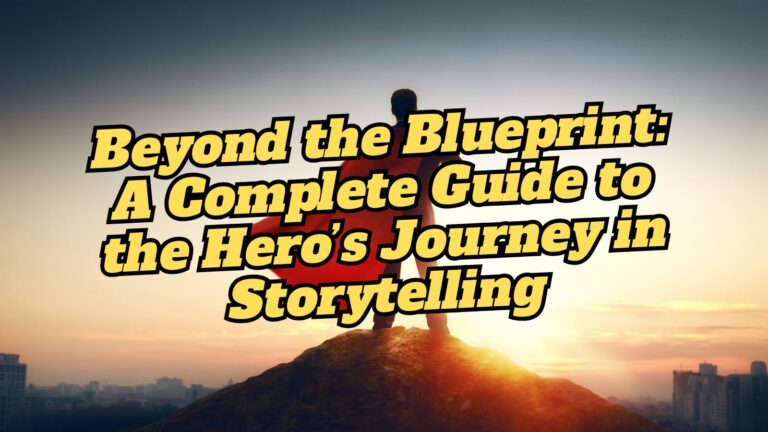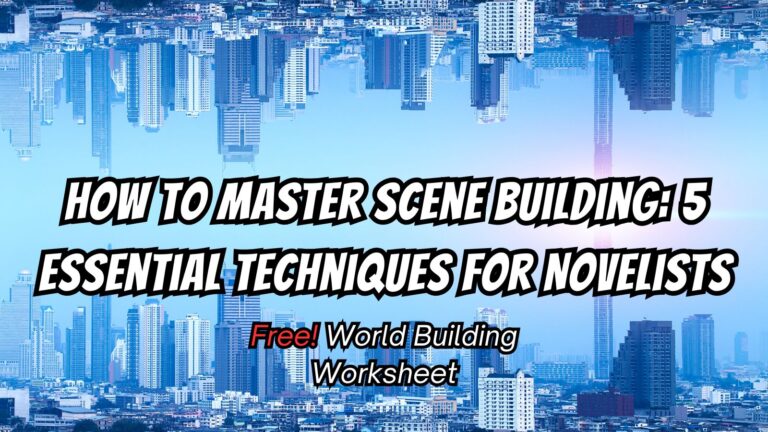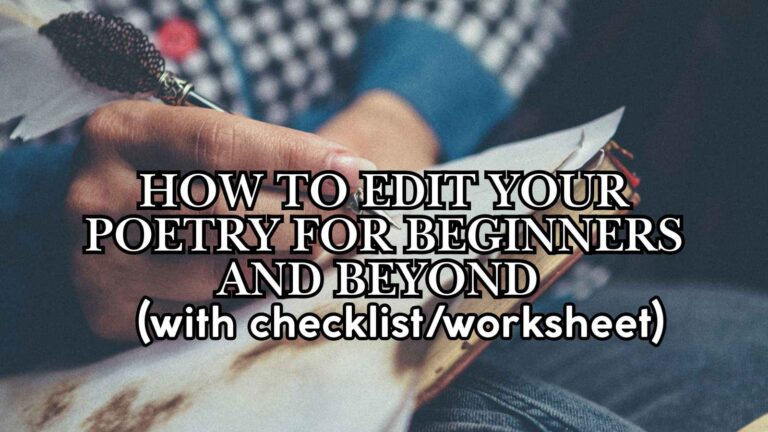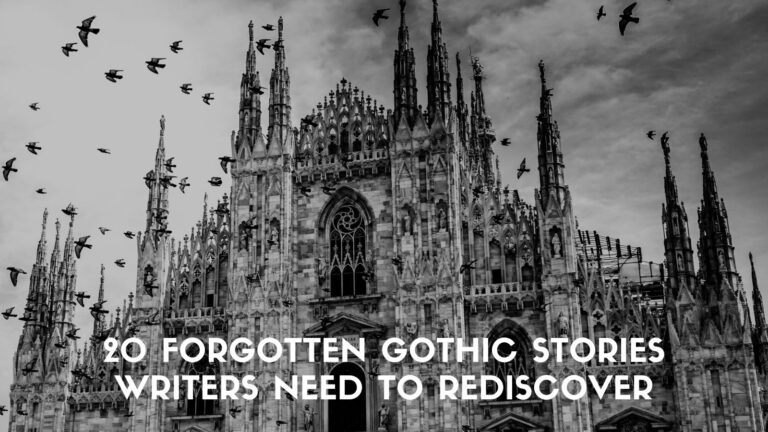How to Edit your poetry for beginners and beyond (with worksheet)
Introduction
Hey everyone, I’m so happy you stopped by! I’ve been wanting to write this article for a long time but never got around to it. As a poet, I know what it is to struggle with writing poetry. Once you’ve written a poem, is it any good? It’s so hard to judge when you are first starting out. I wanted to write this article to give beginning poets or even seasoned poets who are struggling, a little help.
Did you know that Ezra Pound cut 800 lines from T.S. Eliot’s monumental poem “The Waste Land” before publication? It’s shocking what good editing can do to a poem! What emerged was a tighter, more powerful masterpiece that changed modern poetry forever.
I’ve been writing poetry for about 30 years. I’ve been published, have a degree in creative writing, and have been teaching young writers for 23 years. And let me tell you – editing poetry is essential, and no one wants to do it! So many beginning poets I know are sending out their lightly, grammatically edited first drafts, and my heart breaks as the editor of Every Writer, knowing what the poem could have been with just a little tender loving editing.
The truth is that first drafts—even from the most talented poets—are rarely perfect. The real magic happens during revision, when raw inspiration is shaped into lasting art. This article will guide you through the essential steps of editing your poetry, providing practical techniques that can elevate your work from promising to powerful.
And there is a free poetry editing worksheet/checklist you can download in this article that I hope will help.
Why Revision Matters
There’s a profound difference between writing and revising poetry. Writing is often the act of discovery—the wild, untamed rush of ideas and emotions flowing onto the page. Revision is the craft—the deliberate shaping of those raw materials into something that resonates with readers.
Many beginners mistakenly believe that poetry should emerge perfectly formed, that editing somehow diminishes the authenticity of the original inspiration. Nothing could be further from the truth. As Robert Frost once noted, “Poetry is what gets lost in translation.” But I would add: Poetry is what gets found in revision.
When you revise thoughtfully, mediocre writing transforms. The fuzzy becomes clear, the predictable becomes surprising, and the personal becomes universal. Your first draft captures your initial vision—revision helps others see it too.
Poetry as a Growing Art Form
You know what I love about poetry? It grows and changes, just like we do! So many writers think poetry is just about that first flash of inspiration – that magical moment when the words come tumbling out. And don’t get me wrong, that moment IS magical! But here’s the thing I’ve learned after all these years of writing: that’s just the beginning of the journey.
They call writing a “craft” for a reason, you know? It’s like sculpture – we’re continuously chipping away at that block of marble to reveal the beautiful art that was hiding there all along. The first draft is just you hauling that big ol’ block of stone into your workshop. The real creation happens in the editing!
I tell my students this all the time: if a poem is an epiphany – that “aha!” moment when something clicks – then editing is how you shape that realization into something others can experience too. The editing IS part of the inspiration process, not separate from it!
I was working on a poem years ago where two lovers were interrupted in their bedroom. I knew the disruption was the end of something for the lovers. I worked on the poem for over a year. I do this with a lot of my poems – put them away, pull them out 3 months later, and then again and again. I read in the newspaper one day that a couple had divorced after the house next door burned down and the woman was cheating on the man. I immediately knew how they were interrupted. The next time I edited the poem, it became clear, and I finished the poem.
For beginners especially, this is so important to understand. Your first draft might feel emotionally powerful to YOU because you know what you were feeling when you wrote it. But your readers don’t have access to those feelings unless you craft the poem carefully through revision. I’ve seen so many beginning poets get frustrated when others don’t “get” their poem, when the real issue is they haven’t finished the art of making it yet!
So whether you’re just starting out or you’ve been writing for decades like me, remember that editing isn’t something that happens after the “real” writing. It IS the real writing. It’s where the magic happens, where the true poem emerges, and where your initial spark of inspiration gets transformed into art that can light a spark in someone else.# The Art of Revision: How to Edit Your Poetry Like a Pro
The Complication of Feeling, Creation and Structure
Poetry is complex! It’s hard to write. It’s one of the earliest forms of writing, but there is so much that goes into a poem, from all the emotions that create the poem, like Frost said “No tears in the writer, no tears in the reader,” to the complicated variable foot or the iambic tetrameter that you want to try out this time in the poem. You have to break down these pieces to get them right.
The greatest writers of all time could not put a perfect poem down on the page in the first try, so how do you keep all these moving parts straight in your head? Well, this is why I developed this checklist for beginning poets.
Honestly, any writer can use this. This is a checklist I’ve used with my poetry and students for years, but it will really help beginners. It’s broken down in sections – language, imagery, theme, etc… all the moving parts and it’s a simple check on your poem to see how it’s doing.
When I first started teaching, I noticed how overwhelmed my students would get trying to remember everything they needed to consider when revising. One moment they’d be focused on getting the meter right, then suddenly worry about whether their metaphors were fresh enough, and then completely forget to check if the poem’s emotional core was coming through clearly. Sound familiar?
That’s why this checklist exists – to take all that swirling complexity and break it down into manageable pieces. You don’t have to hold everything in your head at once. Instead, you can methodically work through each element of your poem, giving it the attention it deserves.
The Magic Continues in Revision
Hey, we’re wrapping up here, but I want to leave you with something important to remember: editing and revising aren’t separate from creating poetry – they’re a continuation of that same magical process!
You know that feeling when a poem first comes to you? That rush of excitement, that sense that you’ve captured something special? Well, here’s the secret that took me years to figure out – that feeling doesn’t have to end when you finish your first draft. When you revise thoughtfully, you’re actually extending that magic, letting it grow and develop into something even more powerful.
I’ve watched so many beginning poets treat revision like it’s some kind of necessary evil – this boring, technical thing they have to trudge through after the “real” creative work is done. But honestly? If you’re skipping revision or rushing through it, you’re cutting the creative process short! You’re missing out on some of the most satisfying and yes, magical moments in writing.
There’s nothing quite like that “aha!” moment when you finally find the perfect word you’ve been searching for, or when you realize that moving a stanza completely transforms your poem. These discoveries are just as exciting as writing the first draft – sometimes even more so!
So I encourage you, whether you’re just starting out or you’ve been writing for years: embrace revision as part of the joy of creating. Download the checklist, set aside some quiet time with your poems, and approach revision with the same enthusiasm you bring to writing that first draft. Your poems will thank you – and so will your readers!
I can’t wait to see the amazing work you’ll create when you give your poems the full creative journey they deserve. Happy writing – and happy revising!
Get Your Free Poetry Revision Checklist
Ready to transform your poems? Download my free Poetry Revision Checklist by clicking the link below. This printable guide will walk you through the entire revision process, helping you catch common issues and push your poetry to new levels.
[DOWNLOAD YOUR FREE POETRY REVISION CHECKLIST]
After you’ve used the checklist to revise a poem, I’d love to see your before-and-after versions! Share them in the comments below or join our writing community where we regularly workshop and celebrate each other’s revised work.
And if you found this article helpful, subscribe to our newsletter for more writing tips, poetry prompts, and resources to help you grow as a poet. Leave a comment for us! We love to hear if you liked this article or if our advice helped!
Let us know in the comments how you enjoyed the checklist and this article.
- How to Edit your poetry for beginners and beyond (with worksheet) - April 18, 2025
- 20 Forgotten Gothic Stories Writers Need to Rediscover - April 18, 2025
- The Writer’s Roadmap: Embracing Outlining (Free Worksheet Included!) - April 15, 2025
